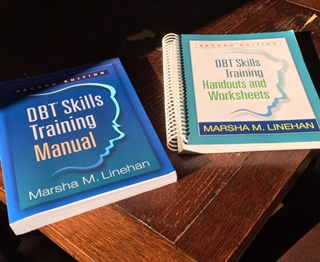
The difficulties associated with Borderline Personality Disorder can sometimes be hard to understand. You may have noticed your friend or family member becoming easily overwhelmed by seemingly small things, in one situation the person may seem to cope but in another situation they may struggle to use the skills that you know they have, they may behave in passive ways at times or become extremely angry and they may have very intense relationships which often end in dramatic ways. The person may be harming themselves in some way (e.g. cutting, binge eating or starving themselves) or behaving in impulsive and reckless ways (e.g. gambling or drinking to excess).
All of the difficulties described can be hard to make sense of both as a family member/friend and for the person affected. Dialectical Behavioural Therapy helps the individual to understand and make sense of their current ways of coping and helps to develop new and more helpful strategies to manage life’s difficulties. At Brighter Horizons Brighton we can give advice and support to family members and friends to help them better understand the difficulties their loved one faces. We believe that, when agreed to by the client, the support of friends and family is a vital component of treatment and something we encourage. If you would like to talk about a family member who you are concerned about, please contact us.
For more information on Borderline Personality Disorder, we recommend the book ‘Stop walking on eggshells’ by Mason and Kreger (https://www.amazon.co.uk/Stop-Walking-Eggshells-Borderline-Personality/dp/1572246901/ref=sr_1_1?s=books&ie=UTF8&qid=1475417480&sr=1-1&keywords=stop+walking+on+eggshells).
All of the difficulties described can be hard to make sense of both as a family member/friend and for the person affected. Dialectical Behavioural Therapy helps the individual to understand and make sense of their current ways of coping and helps to develop new and more helpful strategies to manage life’s difficulties. At Brighter Horizons Brighton we can give advice and support to family members and friends to help them better understand the difficulties their loved one faces. We believe that, when agreed to by the client, the support of friends and family is a vital component of treatment and something we encourage. If you would like to talk about a family member who you are concerned about, please contact us.
For more information on Borderline Personality Disorder, we recommend the book ‘Stop walking on eggshells’ by Mason and Kreger (https://www.amazon.co.uk/Stop-Walking-Eggshells-Borderline-Personality/dp/1572246901/ref=sr_1_1?s=books&ie=UTF8&qid=1475417480&sr=1-1&keywords=stop+walking+on+eggshells).
